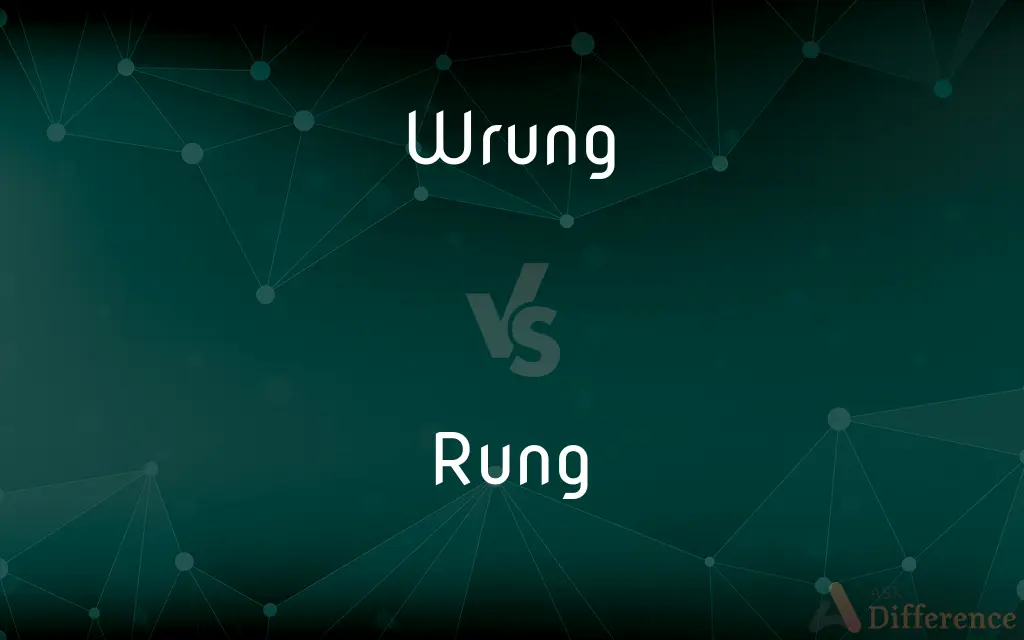Wrung vs. Rung — What's the Difference?
By Maham Liaqat & Fiza Rafique — Updated on April 23, 2024
"Wrung" is the past tense of "wring," referring to the action of squeezing or twisting to extract liquid; "rung" is the past tense of "ring," meaning to make a sound, typically by striking a bell or similar.

Difference Between Wrung and Rung
Table of Contents
ADVERTISEMENT
Key Differences
Wrung is used in contexts where squeezing or twisting something to force out liquid or other substances is required. Rung, on the other hand, is primarily associated with sounds that are made by bells or similar resonant items when struck or otherwise activated.
When discussing physical actions, wrung involves applying pressure, often using hands or a machine, to extract moisture, such as when wringing out a wet cloth. Whereas rung involves actions like striking, shaking, or using mechanisms designed to emit a sound as part of communication or signaling, such as a doorbell being rung.
In metaphorical usage, wrung might describe extracting or applying pressure in a figurative sense, such as "wrung out" from exhaustion. Rung, conversely, can be used metaphorically to denote the occurrence of a notable event, as in "a bell is rung" to signify importance or commencement.
Both terms appear in various expressions and idioms: someone might say they feel "wrung out" after a stressful day, indicating a sense of being drained, while "rung up" could colloquially mean calling someone on the telephone or adding up charges in a store.
Wrung and rung differ in their emotional or sensory implications. Wrung often conveys a sense of effort or strain, appropriate in contexts like manual labor or intense negotiations. Rung, suggesting clarity or resonance, fits scenarios where clear communication or alertness is pivotal.
ADVERTISEMENT
Comparison Chart
Basic Definition
Past tense of "wring," to squeeze out
Past tense of "ring," to make a sound
Common Usage
Squeezing liquid from something
Sound made by a bell or similar object
Metaphorical Usage
Extracting, often with effort
Signaling or announcing
Example Contexts
Laundry, intense discussions
Alarms, telephones, doorbells
Sensory Association
Touch, pressure
Sound, auditory
Compare with Definitions
Wrung
Extracted liquid by twisting or compressing.
She wrung the water from the wet towel.
Rung
Added up to a total in a transaction.
The total cost was rung up at the register.
Wrung
Applied pressure to extract something.
He wrung the information from the reluctant witness.
Rung
Used a telephone to call someone.
She rung her friend to invite her over.
Wrung
Manipulated or handled roughly.
The cloth was wrung until it tore.
Rung
Initiated or started something significant.
The announcement rung in a new era for the company.
Wrung
Caused emotional distress or exertion.
The day's events had wrung her completely.
Rung
Made a resonant or clear sound.
The clear tone rung out across the valley.
Wrung
Achieved or obtained through force or pressure.
The decision was finally wrung from the committee.
Rung
Produced a sound by striking a bell or similar.
The church bell was rung at noon.
Wrung
Past tense and past participle of wring.
Rung
A rod or bar forming a step of a ladder.
Wrung
Simple past tense and past participle of wring
I wrung out my wet jeans and hung them out to dry.
Rung
A crosspiece between the legs of a chair.
Rung
The spoke in a wheel.
Rung
(Nautical) One of the spokes or handles on a ship's wheel.
Rung
A level or degree in a hierarchy
A middle manager awaiting a promotion to the next rung.
Rung
Past participle of ring2.
Rung
A crosspiece forming a step of a ladder; a round.
Rung
A crosspiece between legs of a chair.
Rung
(figurative) A position in a hierarchy.
The lowest rung of the society
Rung
A floor timber in a ship.
Rung
(dated) One of the stakes of a cart; a spar; a heavy staff.
Rung
One of the radial handles projecting from the rim of a steering wheel.
Rung
One of the pins or trundles of a lantern wheel.
Rung
Past participle of ring
Rung
Of a pig: having a ring through the nose.
Rung
A floor timber in a ship.
Rung
One of the rounds of a ladder.
Rung
One of the stakes of a cart; a spar; a heavy staff.
Rung
One of the radial handles projecting from the rim of a steering wheel; also, one of the pins or trundles of a lantern wheel.
Rung
A crosspiece between the legs of a chair
Rung
One of the crosspieces that form the steps of a ladder
Common Curiosities
How are wrung and rung pronounced?
Both words are pronounced similarly, but contextually they relate to different actions.
Are wrung and rung interchangeable?
No, they are not interchangeable as they derive from different verbs with distinct meanings.
What is a common mistake people make with wrung and rung?
A common mistake is confusing the two due to their similar pronunciation and past tense forms but differing in meaning.
Is it correct to say "wrung the doorbell"?
No, the correct expression would be "rung the doorbell," as it involves producing a sound.
What does wrung mean?
Wrung is the past tense of wring, referring to the action of squeezing or twisting something to extract liquid or another substance.
Why is the correct form important between wrung and rung?
Using the correct form is essential for clear communication and to avoid misunderstandings.
What does rung mean?
Rung is the past tense of ring, typically used to describe the sound made by a bell or a similar object when struck.
Can both wrung and rung be used metaphorically?
Yes, wrung can imply extracting or enduring pressure metaphorically, and rung can denote announcing or initiating something metaphorically.
Which professions are more likely to use the term wrung?
Professions like laundry services, physical therapists, and negotiators might use "wrung" more frequently.
How might one use wrung in a sentence about everyday chores?
"She wrung out the sponge after cleaning the dishes."
What is an example of rung used in technology?
"He rung the customer using the video call feature."
What can be wrung?
Objects that hold moisture like cloths, sponges, or wet clothing can be wrung.
What typically gets rung?
Bells, alarms, and sometimes metaphoric items like a new change can be rung.
Is there an emotional difference in the impact of wrung vs. rung?
Yes, wrung often has a more physical or exhausting connotation, whereas rung is generally associated with clarity or alerts.
Can wrung be used in a business context?
Yes, it can be used metaphorically to describe extracting the maximum potential or results from a situation.
Share Your Discovery

Previous Comparison
Carriage vs. Freight
Next Comparison
Histology vs. CytologyAuthor Spotlight
Written by
Maham LiaqatCo-written by
Fiza RafiqueFiza Rafique is a skilled content writer at AskDifference.com, where she meticulously refines and enhances written pieces. Drawing from her vast editorial expertise, Fiza ensures clarity, accuracy, and precision in every article. Passionate about language, she continually seeks to elevate the quality of content for readers worldwide.
















































